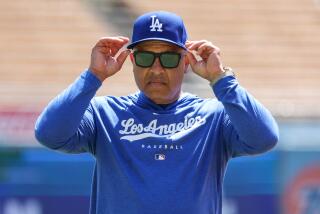New Dodgers executive Steve Soboroff has been there
On his second day as Dodgers vice chairman, Steve Soboroff was meeting with a club finance executive and the head of a charitable foundation when he learned that Major League Baseball had seized control of the franchise.
Soboroff was so shaken by the news, he said, that he scarfed down a second lunch, forgetting he’d already eaten.
“I was shocked,” he said. “The finance guy looked like he’d had a heart attack.”
Instead of clamming up and taking time to absorb the meaning of the takeover, though, Soboroff came out swinging, questioning Commissioner Bud Selig’s motives and timing and fiercely defending his new boss, Frank McCourt.
He called the Dodgers owner a flawed but changed man who no longer cares about fancy houses and the trappings of wealth, and now realizes he made a mistake using the Dodgers as his personal ATM. And he wants to make it up to Los Angeles.
This “Rebecca of Sunnybrook Farm” strategy has some questioning Soboroff’s judgment, if not his sanity.
“They think, ‘My God, this guy has lost his mind,’ ” Soboroff said in a late-night phone conversation Thursday. “Am I losing my marbles? No.”
He did say, however, that he would not have accepted the job had he known Selig was about to take the team: “I’m not stupid.”
Soboroff, 63, is used to leading besieged projects. The wealthy Pacific Palisades developer has been a prime mover in a number of civic endeavors that looked impossible at the outset: the Alameda transportation corridor, Staples Center, reconstruction of the Venice boardwalk and the massive Playa Vista project in the environmentally sensitive Ballona Wetlands.
He says McCourt’s situation does not faze him.
“I’ve done this over and over again,” Soboroff said. “His popularity, his approval rating are low. If you want to buy stock on something that is low and going to go high, that’s it. The smartest people buy when everybody else is selling. That’s what I’m doing.”
Former Los Angeles Mayor Richard Riordan tapped Soboroff, a moderate Republican, as his successor in 2001. It was Soboroff’s only flirtation with public office. He came in third and returned to the private sector.
“Next to Eli Broad, Steve has done more for the city of Los Angeles than anybody,” Riordan said. “The reason we have Staples where it is is because of Steve.”
Riordan said Soboroff determined after a helicopter tour that the best place for a sports arena would be next to the Convention Center. “I said, ‘Don’t waste my time. The politics will kill it.’ But he made it happen.”
Likewise, Riordan said, the Alameda Corridor — a rail-only cargo route between the port and downtown — was in the planning stages for two decades. “He got all the railroads to agree so their contract could be used as security for bonds,” Riordan said. “He came in a year ahead of schedule and 10% below budget.”
Soboroff was making a fortune in commercial real estate, with shopping malls in Mar Vista and Malibu, when Riordan named him a senior advisor. Working for no salary, he headed the Recreation and Parks Commission and a group that oversaw school construction funds.
Six months after he lost the mayor’s race, he became president and chief executive of Playa Vista, a long-embattled project on the western edge of the city, southeast of Marina del Rey. He said he was able to turn around the financial fortunes of the development, part of which is still bogged down in litigation, before stepping down a year ago in search of a new challenge. He worked on bringing a Whole Foods market to Malibu.
The Dodgers offered something much more fulfilling.
“I was looking for a place, looking for something to intuitively say: This is what I was put here to do,” Soboroff said. “Kaboom. This is it. My heart rate has increased; I am ready to do this. I feel like I am a thoroughbred back in the gate.”
Soboroff has always stood out for his belief in the righteousness of his missions and the purity of his motive. Also, for his temper.
When he began his doomed mayoral campaign, he was so confident about his lack of baggage that he offered a reporter a binder of opposition research compiled on him by his political consultant, Ace Smith. One of his exploitable weaknesses: “hothead.”
“Steve likes to think that his perception of things is the only perception,” said Councilman Bill Rosendahl, who won office in 2005 as an opponent of Playa Vista’s 2,600-home second phase, which is still in litigation. The project had been approved by the council, but after it became the subject of a lawsuit, a new vote was required. Rosendahl informed Soboroff he would vote no.
“He went bananas,” Rosendahl said.
Sabrina Venskus, attorney for the plaintiffs in the Playa Vista case, said Soboroff can turn the charm on and off. “He is one of these guys who seem really nice and professional and jolly good Santa Claus on the outside,” Venskus said, “but if he doesn’t like what you are doing, he has no bones about speaking to you as rudely as anyone.”
Soboroff was born in Chicago but is a creature of Los Angeles, deeply connected to the city’s power structure and charitable foundations. (He is chairman of the Weingart Foundation and has been heavily involved in Big Brothers of Greater Los Angeles.) That would be valuable to the Dodgers. But perhaps more enticing for McCourt was Soboroff’s development experience, given the 300-acre Chavez Ravine site, the development of which has been an undercurrent in the discussion of the Dodgers’ future.
Soboroff graduated from Taft High School in Woodland Hills and worked at his mother’s custom linen-and-gift store in Beverly Hills. Summers during college, he babysat the younger sons of one of his mother’s customers, Anne Douglas, and chauffeured her husband, Kirk. On his first day as Kirk’s driver, he took the movie star to Sharon Tate’s funeral.
In 1971, after graduating from the University of Arizona, Soboroff went to work for the developer who created Lakewood Center Mall, Fallbrook Square and West Covina’s Eastland Mall before launching his own business.
During his early morning walk Friday, Soboroff said in an email that he had reconsidered his attacks on Selig.
“The commissioner is an accomplished and good man,” he said. “He has the right to be wrong on the way that this is happening now. We respect him, his office, other owners, fans and the institution of baseball.”
In the meantime, among many Dodger duties, Soboroff is trying to turn McCourt into a man of the people.
“I said, ‘Frank, ever been to Apple Pan? Ever been to Philippe’s? You are sitting in the box with a bunch of elitists; come on out to the bleachers and have fun! Let the poor people have the box.”
Times staff writer David Zahniser contributed to this report.
More to Read
Sign up for Essential California
The most important California stories and recommendations in your inbox every morning.
You may occasionally receive promotional content from the Los Angeles Times.











